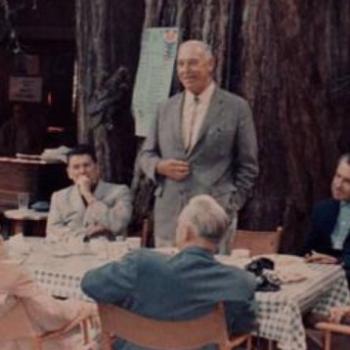“Establishing causation is difficult” Peter Beinart writes for The Atlantic, in “Breaking Faith.” That admission is good to see in a piece that I think often gets causation backwards.
Beinart is looking at a host of recent survey data regarding formerly religious Americans who no longer go to church. As in many such pieces, he reports that “those who don’t regularly attend church are more likely to suffer from divorce, addiction, and financial distress.” Well, OK, yes. But this correlation doesn’t necessarily support Beinart’s apparent assumption that church-attendance would make these folks less likely to “suffer from” any of the above. It’s also entirely possible — and quite likely once you allow yourself to think about it — that all of these things make church-going more difficult and less likely.
Consider just the most obvious matter of the correlation between divorce and church-going. The implications of that correspondence become clearer, I think, if we consider a more specific case: Catholics who are divorced are far, far less likely to receive the sacrament of communion at Mass. Does this mean that failing to attend Mass to receive that sacrament makes Catholics more likely to divorce? Not at all. It’s simply a function of the fact that divorced Catholics are not permitted to do so. Therefore, what happens to Catholics after they get divorced? They cease to be welcome at church and, thus, they tend to stop going.

The same thing happens in Southern Baptist churches, and in many nondenominational white evangelical congregations. Churches that have strict policies restricting the participation of people who have been divorced produce a steep decline in church attendance by people who have been divorced.
It’s beyond strange that this rarely gets considered by social scientists exploring the relationship between divorce and church attendance. A similar blindspot seems to be at work in their examination of the relationship between addiction and church attendance. Addiction makes church attendance more difficult in a host of ways, but these researchers tend to ignore that, preferring to hint that somehow attending church services wards against addiction.
So too with “financial distress.” People who lose their jobs and see their cars get repossessed cannot drive to church. It’s weird to try to flip that simple fact around into the theory that driving to church somehow makes it less likely that you’ll lose your job.
Consider a more stark example: People incarcerated for a felony are far less likely to regularly attend church services at a local church. Is this because regular church-attendance instills a kind of morality that somehow makes church-goers less likely to commit felonies? Or is it because people who are locked up in prison aren’t allowed out to go to church on Sundays? Either one might explain this phenomenon, so who can say for sure?
There’s also an upstairs/downstairs confusion involved in this notion that “those who don’t regularly attend church are more likely to suffer from … addiction.” That’s only true if the only thing we mean by “regularly attend church” is regular attendance at the worship services in the sanctuary upstairs on Sunday mornings. If we count AA and NA meetings in church basements, then my guess is we’ll find people who “suffer from … addiction” are likely to set foot in church more often than those who do not. The fact that those who attend such meetings are less likely to be integrated into the community of worshippers that gathers upstairs Sunday morning tells us a lot about our ecclesiology, but it doesn’t suggest much of anything about the effectiveness of worship-service-attendance as a prophylactic against addiction.
“Establishing causation is difficult,” but it’s made far more difficult when we’re not skeptical of the spin from social scientists who seem to have set out to find the benefits of church-attendance. They’re determined to find evidence to support their theory that church-attendance makes good Americans healthy, wealthy, and wise, and so they marshal their survey data to show that “those who don’t regularly attend church are more likely to suffer from divorce, addiction, and financial distress” and try to teach their lesson that we all should try to guard against divorce, addiction and financial distress by going to church.
But it’s entirely possible that this is the wrong lesson to learn from the data they’ve collected. The very same survey data they’ve collected might simply demonstrate something very different. It may simply prove that our churches are really, really bad at welcoming people who are divorced, addicted, or suffering from financial distress. We know, as a matter of incontrovertible fact, that divorced people are explicitly told — as a matter of policy — that they are unwelcome in many churches. And it doesn’t strain our imagination to wonder whether the addicted or those facing financial distress are similarly being turned away by a church culture that doesn’t want their kind around.
The social science data Beinart leans on here also carries a whiff of True Scotsman desperation. That’s where a lot of this newfound interest in measuring and re-measuring church attendance seems to come from. It’s part of the hunt for something distinctive about a religious community that wants to regard itself in the terms of 1 Peter 2:9, “But you are a chosen race, a royal priesthood, a holy nation, God’s own people, in order that you may proclaim the mighty acts of him who called you out of darkness into his marvelous light.”
In the King James Version, that verse uses the phrase “a peculiar people,” but white evangelical Americans have a hard time finding any commendable distinctive that sets them apart from their neighbors as peculiar or exceptional. They’re dismayed by every measure of the social ills they lament — poverty, addiction, divorce, marital fidelity, abortion rate, pornography use — disappointed to find little there that sets them apart as “peculiar” when compared to the rest of American society. So they seek to refine such measurements to screen out those who aren’t True Scotsmen, who aren’t real, true evangelicals. Maybe those who attend church Wednesday nights and twice on Sundays will come out a little better than those who don’t? Maybe if we only count evangelicals who strictly abide by at least 20 minutes of daily devotional quiet time? Maybe if we …?
The product of that isn’t just suspect social science that can’t resist putting its thumb on the scale. It also produces a deformed theology, a warped understanding of religiosity that redefines itself according to whatever it is that we’re hoping or trying to measure.
That’s part of what’s going on in the strange latter half of Beinart’s piece, wherein he attempts to frame Black Lives Matter as a kind of “post-Christian” movement. If we start with the assumption that real, true religion can’t be found in the streets, then anything in the streets must be post-religious. If we ascribe justice and love for our neighbors as concerns that are “spiritual, but not religious,” then we will train ourselves to regard those things as separate from, or even opposed to, real, true religion.
This increasing emphasis on church-attendance as a truer, more legitimate measure of religiosity is particularly strange when we contrast it with the repeated biblical theme that church-attendance, in itself, is often offensive to God. “Who asked this from you?” God says in the first chapter of Isaiah, “trample my courts no more.” Here’s a chunk of that passage in Eugene Peterson’s contemporary translation:
Quit your worship charades.
I can’t stand your trivial religious games:
Monthly conferences, weekly Sabbaths, special meetings —
meetings, meetings, meetings — I can’t stand one more!
Meetings for this, meetings for that. I hate them!
You’ve worn me out!
I’m sick of your religion, religion, religion,
while you go right on sinning.
When you put on your next prayer-performance,
I’ll be looking the other way.
No matter how long or loud or often you pray,
I’ll not be listening.
And do you know why? Because you’ve been tearing
people to pieces, and your hands are bloody.
Go home and wash up.
Clean up your act.
Sweep your lives clean of your evildoings
so I don’t have to look at them any longer.
Say no to wrong.
Learn to do good.
Work for justice.
Help the down-and-out.
Stand up for the homeless.
Go to bat for the defenseless.
Isaiah says that God says that the measure of legitimate religion is not church-attendance. It is, rather, this: “Seek justice, rescue the oppressed, defend the orphan, plead for the widow.” Do all of that and only then will God tolerate your showing up for church. Otherwise, church-attendance is something God is weary of putting up with — something God “detests.”
I suppose we could just conclude that the prophet Isaiah is yet another example of a “post-Christian perspective,” but that seems tricky considering that he was writing centuries before the birth of Christ.
















